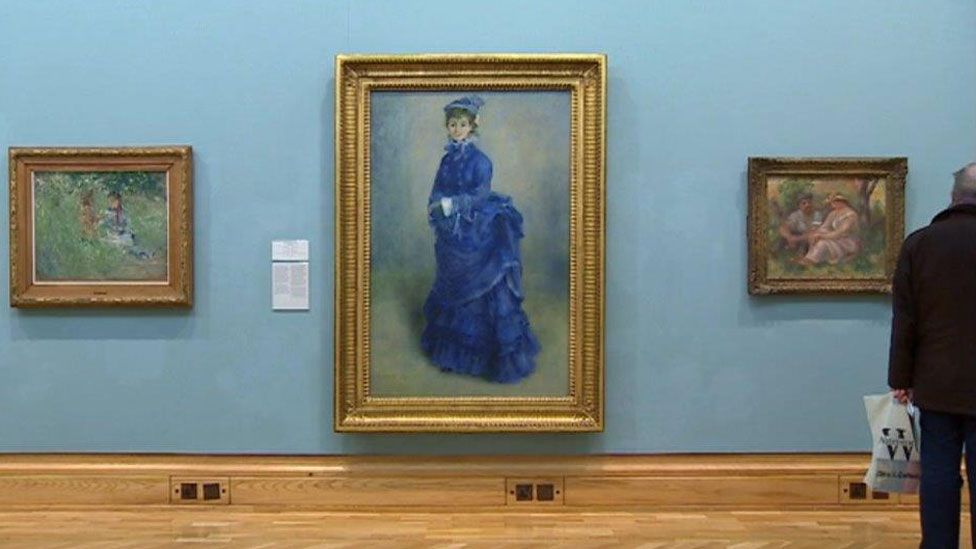Historic Wales museum fear unfounded - Ken Skates
- Published

Fears about the creation of a new heritage body are "unfounded," the Welsh Government has insisted.
Economy secretary Ken Skates said Historic Wales would encourage greater collaboration and attract more funding to the sector.
Senior industry figures warned the new body would undermine the independence of National Museum Wales and the National Library.
But Mr Skates told BBC Wales the institutions were not under threat.
"It's not a question of whether institutions should remain independent, of course they should. It's about how they can work together to benefit the entire sector," he said.
"We need to do more with our institutions to make them relevant on a daily basis to people's lives. It's almost impossible to do that alone, so if we are going to be stronger we are going to have to be stronger together. That means working together to promote the incredible assets we've got."
A steering group is considering which commercial functions of the National Museum - which has seven sites - could be merged with Cadw, an arm of the Welsh Government responsible for historic monuments.
These include 44 castles and nine Roman sites.
It may also consider merging some functions from the National Library and the Royal Commission on the Ancient and Historical Monuments of Wales.
Options set out in a report are:
- Improving commercial skills and joint working of national heritage organisations
- Or creating a new charity
- Or creating a new executive agency
- Or merging the national heritage organisations
Sharon Heal, director of the Museums Association, said: "If the commercial functions were to be merged then that would undermine National Museum Wales' capacity to raise its own income, but also more than that - to decide on its exhibition programming and to form partnerships with communities and local museums throughout Wales.
"National Museum Wales does have a really world class reputation in terms of working in collaboration and building partnerships and it does that with local museums, with international organisations and with its local communities.
"So it's got a strong track record of working in collaboration, and what it needs is the independence to be able to do that."
Ms Heal said other parts of the UK would not consider forming a body like Historic Wales.
"I can assure you that it is completely unprecedented. Governments in England, Scotland and Northern Ireland respect and celebrate the independence of their national institutions and in particular, in Scotland and Northern Ireland, understand the role that they play in nation-building and I would hope that the government in Wales would respect that in Wales as well."
Mr Skates said Historic Wales would get more people involved in museums, libraries and heritage sites and offer a greater degree of commercial income which could be reinvested.
"We spend tens of millions of pounds of taxpayers' money on national institutions to serve taxpayers, so it is essential that there is accountability.
"That accountability is via me, I need to make sure that national institutions are more relevant to people's lives, that more people are getting through the doors and are engaging with opportunities I know the national institutions can offer."
Mr Skates would not be drawn on which functions should be merged.
"I think it's absolutely essential that I listen to experts, that I hear from those experts about what it is they can do better, together, for the entire sector," he added.
A number of objections to Historic Wales have been received by the assembly's culture committee, which heard evidence from NMW's director general David Anderson who said the new body risked leaving the museum "tied by the legs".
Fellow objector and former librarian of the National Library, Andrew Green, said the independence of the institutions was at stake.
"I've got several concerns. One is about lifting commercial activity - raising money, publicity, marketing and so on - out of everything else that the national museum and the National Library do. That seems to me to be artificial and could have a very deleterious effect on the other activities of those bodies.
"It also calls into question the independence of the national museum and the National Library from government. It's very important that they are at arms length from the government.
"What will happen to their status as charities, as Royal charter bodies, as companies, once this change has happened?
"We don't know what Historic Wales is going to be, what kind of powers it will have. Will it have very extensive powers which will take away a great deal from the National Library and the national museum and weaken them fatally?"
The steering group considering merger options is due to make a recommendation to the government in early 2017, with any decision on closer ties being put to a public consultation later in the year.
- Published7 October 2016
- Published28 September 2016